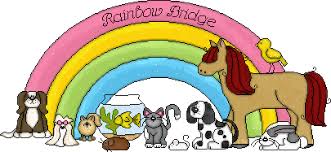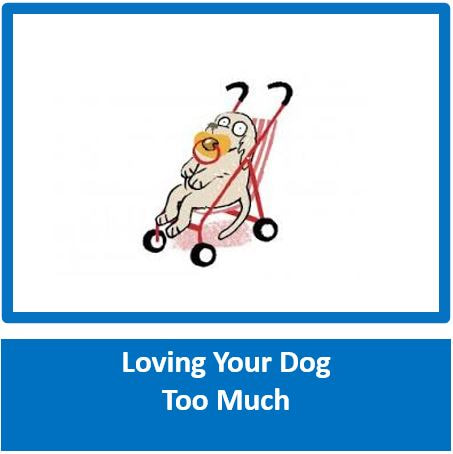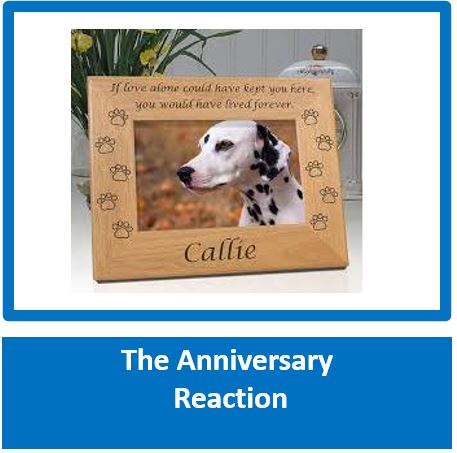How Soon Should You Adopt a New Dog After Your Pet Passes?
www.rainbowsbridge.com
This great website has a Grief Support Facility should you feel you need help
www.rainbowsbridge.com
This great website has a Grief Support Facility should you feel you need help

When your pet dies, how soon should you get a new one? Until recently, the standard answer has been "right away!" That may not always be the best advice, however: Obtaining a new pet before you have had time to work through your grief can cause problems for both you and the pet. So when is the right time? There is no single answer to that question, because everyone experiences grief in their own way.
For some, the loneliness of an empty house makes grieving more difficult, and a new pet can help the process. Others, however, may feel resentful toward a pet obtained too soon. The time to obtain a new pet is when you have worked through your grief sufficiently to be confident that you can look forward to new relationships, rather than backward at your loss. For some people, that might be a matter of days or weeks; for others, it might be months or years.
Regardless of when you choose to obtain a new pet, however, the following suggestions can help you ease the transition and make the new relationship more rewarding for you, your family, and the pet.
One of the most touching ways Guardians have used to memorialize their furbabies after the horrific attack on September 11th., 2001 was adding a US flag at their babies Rainbow Memorial Residency. Though a small gesture, it was a comfort to many of our Guardians.
Tips on Choosing a New Pet
Don't make a hasty decision. Give yourself time to think. Don't let anyone rush you into a decision or pressure you into making a choice that isn't right for you. (If it isn't right for you, it won't be right for the pet either!) Also, don't let a well-meaning friend or relative force the decision on you by getting you a new pet before you are ready.
Don't think of the new pet as a "replacement" for your previous pet. You don't replace relationships; you build new ones. Your new pet will be a companion with whom you build an entirely new set of memories and experiences. Do look for a pet that is in some way different from your previous pet. If possible, select a different breed or sex. Avoid obtaining a "lookalike" pet, because if your new pet looks like your previous pet, it is easy to be disappointed when it doesn't act like that pet. Consider a pet with different colorings or markings from your previous pet. Do research your choice carefully. Shelters are deluged with pets who were selected unwisely and subsequently "dumped." Make certain the breed, size, sex, behavior, and needs of your new pet are appropriate for your lifestyle. Avoid the temptation to adopt the first animal you see to "fill the void."
Do involve all family members in the decision to obtain a new pet. In particular, consider the needs and feelings of your children. Children build strong attachments to pets, and may feel that giving their love to a new pet is "disloyal" to the previous pet. Make certain all members of the family have had a chance to work through their individual grieving process. Involve everyone in discussions of what sort of pet to obtain. If possible, let your children help you select a new pet. Don't give your new pet the same name (or nickname) as your previous pet.
Don't expect your new pet to be just like the one you lost. Don't expect the new pet to do the same things your previous pet did, respond in the same ways, or have the same characteristics. Instead, enjoy your new pet's individual behaviors, responses, and characteristics as they develop. Don't compare your new pet to your previous pet. After many happy years with an animal companion, it is easy to forget that, when it was a puppy or kitten, it, too, was destructive, disobedient, noisy, or un-housetrained. Your new pet will soon grow out of its "difficult" phase.
Do consider the needs of your surviving pets. Will they welcome or resent a newcomer? Some pets seem to genuinely mourn the loss of a companion, and you may find that you need to introduce a new pet simply to comfort the survivor. Remember, however, that most cats and dogs are territorial by nature, and that it will take them time to adapt to a new pet. Once you have introduced a new pet into the household, make sure your existing pets receive lots of attention. Do consider obtaining a new pet before the loss of your previous pet. If your pet is growing old, or is ill, consider introducing a new pet into your home now. In many cases, the presence of a young and active pet has revitalized an older animal. More importantly, this avoids the problem of attempting to build a relationship with a new pet while you are still grieving for the previous pet.
Some additional considerations:
If your pet died of a contagious illness, make certain your home is thoroughly cleaned before a new pet is brought in. Dispose of items that might carry the illness, such as bedding, rugs, or toys. Give some thought to the disposition of your pet's belongings. Some people enjoy passing a pet's things to a new pet; others, however, feel that such items should not be transferred. If you prefer to dispose of your pet's possessions, consider whether a shelter might benefit from those that are in good condition.
If you're not certain whether you're ready for a new pet, but you need to cuddle something furry and warm, consider volunteering as a "pet cuddler" or even a foster parent to help socialize adoptable animals at your local shelter. You'll be able to give love and receive comfort without making a commitment. And who knows? You may discover the perfect companion to share your life!
When a pet dies, grief is a normal and natural response. Never let anyone tell you that you are crazy or silly to grieve over "just an animal." The loss of a relationship brings pain-so do what you need to do to work through that pain. Cry, grieve, pound a pillow, talk to a friend or support group, conduct a memorial service that will help you pay tribute to your pet while saying good-bye. Then, when the time is right for you, you'll be able to share your love with a new, well-chosen animal companion.
For some, the loneliness of an empty house makes grieving more difficult, and a new pet can help the process. Others, however, may feel resentful toward a pet obtained too soon. The time to obtain a new pet is when you have worked through your grief sufficiently to be confident that you can look forward to new relationships, rather than backward at your loss. For some people, that might be a matter of days or weeks; for others, it might be months or years.
Regardless of when you choose to obtain a new pet, however, the following suggestions can help you ease the transition and make the new relationship more rewarding for you, your family, and the pet.
One of the most touching ways Guardians have used to memorialize their furbabies after the horrific attack on September 11th., 2001 was adding a US flag at their babies Rainbow Memorial Residency. Though a small gesture, it was a comfort to many of our Guardians.
Tips on Choosing a New Pet
Don't make a hasty decision. Give yourself time to think. Don't let anyone rush you into a decision or pressure you into making a choice that isn't right for you. (If it isn't right for you, it won't be right for the pet either!) Also, don't let a well-meaning friend or relative force the decision on you by getting you a new pet before you are ready.
Don't think of the new pet as a "replacement" for your previous pet. You don't replace relationships; you build new ones. Your new pet will be a companion with whom you build an entirely new set of memories and experiences. Do look for a pet that is in some way different from your previous pet. If possible, select a different breed or sex. Avoid obtaining a "lookalike" pet, because if your new pet looks like your previous pet, it is easy to be disappointed when it doesn't act like that pet. Consider a pet with different colorings or markings from your previous pet. Do research your choice carefully. Shelters are deluged with pets who were selected unwisely and subsequently "dumped." Make certain the breed, size, sex, behavior, and needs of your new pet are appropriate for your lifestyle. Avoid the temptation to adopt the first animal you see to "fill the void."
Do involve all family members in the decision to obtain a new pet. In particular, consider the needs and feelings of your children. Children build strong attachments to pets, and may feel that giving their love to a new pet is "disloyal" to the previous pet. Make certain all members of the family have had a chance to work through their individual grieving process. Involve everyone in discussions of what sort of pet to obtain. If possible, let your children help you select a new pet. Don't give your new pet the same name (or nickname) as your previous pet.
Don't expect your new pet to be just like the one you lost. Don't expect the new pet to do the same things your previous pet did, respond in the same ways, or have the same characteristics. Instead, enjoy your new pet's individual behaviors, responses, and characteristics as they develop. Don't compare your new pet to your previous pet. After many happy years with an animal companion, it is easy to forget that, when it was a puppy or kitten, it, too, was destructive, disobedient, noisy, or un-housetrained. Your new pet will soon grow out of its "difficult" phase.
Do consider the needs of your surviving pets. Will they welcome or resent a newcomer? Some pets seem to genuinely mourn the loss of a companion, and you may find that you need to introduce a new pet simply to comfort the survivor. Remember, however, that most cats and dogs are territorial by nature, and that it will take them time to adapt to a new pet. Once you have introduced a new pet into the household, make sure your existing pets receive lots of attention. Do consider obtaining a new pet before the loss of your previous pet. If your pet is growing old, or is ill, consider introducing a new pet into your home now. In many cases, the presence of a young and active pet has revitalized an older animal. More importantly, this avoids the problem of attempting to build a relationship with a new pet while you are still grieving for the previous pet.
Some additional considerations:
If your pet died of a contagious illness, make certain your home is thoroughly cleaned before a new pet is brought in. Dispose of items that might carry the illness, such as bedding, rugs, or toys. Give some thought to the disposition of your pet's belongings. Some people enjoy passing a pet's things to a new pet; others, however, feel that such items should not be transferred. If you prefer to dispose of your pet's possessions, consider whether a shelter might benefit from those that are in good condition.
If you're not certain whether you're ready for a new pet, but you need to cuddle something furry and warm, consider volunteering as a "pet cuddler" or even a foster parent to help socialize adoptable animals at your local shelter. You'll be able to give love and receive comfort without making a commitment. And who knows? You may discover the perfect companion to share your life!
When a pet dies, grief is a normal and natural response. Never let anyone tell you that you are crazy or silly to grieve over "just an animal." The loss of a relationship brings pain-so do what you need to do to work through that pain. Cry, grieve, pound a pillow, talk to a friend or support group, conduct a memorial service that will help you pay tribute to your pet while saying good-bye. Then, when the time is right for you, you'll be able to share your love with a new, well-chosen animal companion.





